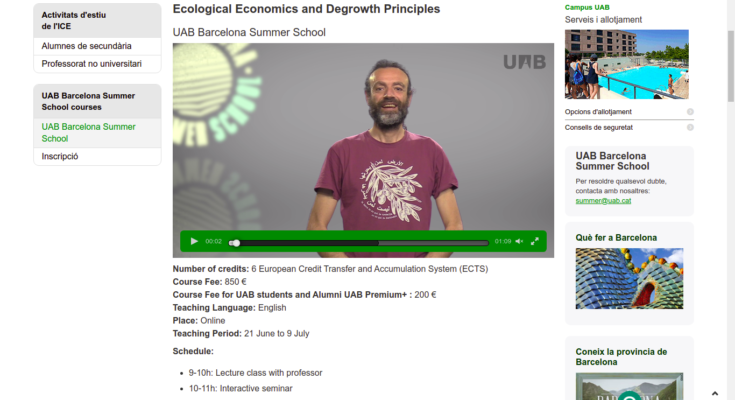The conventional economic model is based on the hypothesis of infinite monetary growth, made of virtual bank money. Nonetheless it also requires considerable inputs of energy and materials, which are not infinite and have an impact on our planet. Environmental signals show us we are on the edge of a crisis and the uncertainty about our future environment relates to the development of a new discipline: ecological economics.
The course aims at presenting a new perspective in the economic field by relating it to the environment: it will consider the possibility of green economic growth, the main dilemmas and implications for the environment; students will be able to contrast two economic visions, that of growth-based economics and of ecological economics and the real-world implications of each one: the trade-off between economic growth (and job creation) and environmental protection and social justice. Furthermore, it aims to re-embed economic analysis with social and human dimensions.
The course will adopt Team-Based Learning, a novel teaching method in which the students have to read and watch compulsory material prior to the class, and will be evaluated with a closed-answer quiz. During the first hour of some classes, presentations of video or book extracts will be done, as well as brief reports.
Other days, the first hour will be dedicated to interactive discussions based on the assignments given beforehand, for the preparation of the class. The second hour will normally consist of a taught class. In the third hour, each student will be offered a tutorial, individually or in a small group, on a weekly basis. A couple of hours of guided activities will follow, mainly related to watching videos or learning about the environmental justice atlas, or the social multi-criteria evaluation.
Homework assignments will mainly consist of reading written documents (books and papers) and the preparation for the group presentations of the next morning, or the writing of short reports based on the activities and exercises done in class.
MORE INFORMATION HERE
Number of credits: 6 European Credit Transfer and Accumulation System (ECTS)
Course Fee: 850 €
Course Fee for UAB students and Alumni UAB Premium+ : 200 €
Teaching Language: English
Place: Online
Teaching Period: 21 June to 9 July
Schedule:
- 9-10h: Lecture class with professor
- 10-11h: Interactive seminar
- 11-12h: Organised tutoring sessions
Registration of international and national students (non-UAB students) before May 16 will get 20% discount.
Contact: summer@uab.cat
PROFESSOR BIO INFORMATION
Claudio Cattaneo holds a PhD in environmental science and is a contract professor of Ecological Economics at UAB and director of the ICTA-UAB Master Course in Political Ecology Degrowth and Environmental Justice. He is a member of Research and Degrowth and of the Can Masdeu eco-community, in the hills of Barcelona. His research interests are related to social metabolism, agroecology, energy-landscape integrated analysis and analysis of the squatters movement. He his author of several papers in peer-reviewed journals, book chapters and editor of the book “The Squatters Movement in Europe, Pluto Press”. He has a 15-year teaching experience in ecological economics.
- Department of Economy and History of Economics
- E-mail: Claudio.cattaneo@uab.cat
Week programme
| Week | Contents | Teaching / lerning activites |
|---|---|---|
| 1 | Foundations of Ecological Economics, field trips | Monday: presentation of the course.
Tuesday to Friday: compulsory home readings, quiz, short class, video watching, team work, class presentation and discussion. |
| 2 | Applications of Ecological Economics | Compulsory home readings, quiz, short class, video watching, team work, class presentation and discussion |
| 3 | Degrowth principles, field trips in town | Monday and Tuesday: compulsory home readings, quiz, short class, video watching, team work, class presentation and discussion. |
Evaluation
Outputs and exercises that the student is going to do to have the qualification. Including deadlines. NOTE that one day before the end of the period the student’s performance must be completely evaluated and communicated to summer@uab.cat. Class attendance, with signature sheet, 35% of the final mark, with 100% attendance = 10, 50% = 5 and so on.
From day 2 to day 13 of the course: 5-6 team-based closed-answer quizzes, based on the compulsory readings in preparation to the class. [Contributing to 35% of the final mark].
From day 2 to day 12 of the course: group video presentations –depending on the size of the team and the number of enrolled students, each team will present once in class. [Contributing to 15% of the final mark].
By the beginning of week 3 prepare a report based on an environmental conflict that the team has analyzed, for uploading in the Atlas of Environmental Justice (ejatlas.org) [Contributing to 15% of the final mark].
By the end of the class on day 13 (Wednesday of week 3), it is expected the student evaluation will have been completely evaluated and communicated.
Links and references
Week 1: Foundations of ecological economics.
Readings will be available from this online book (most in Part I and Part II): http://indomarine.webs.com/documents/Ecological_Economics_Principles_And_Applications.pdf
The EJ atlas (ejatlas.org)
Week 2: Applications of ecological economics.
A tutorial booklet on Social Multicriteria Evaluation (attached, with further readings in the reference section)
Week 3: degrowth principles 5-6 activities from this website (those that follow “The story of stuff”): The first 9 activities from this website: https://www.endlich-wachstum.de/kapitel/materials-in-english/
Reading of papers related to degrowth:
Analyze and discuss part of the book “Degrowth, a vocabulary for a new era” and the book Pluriverse”


